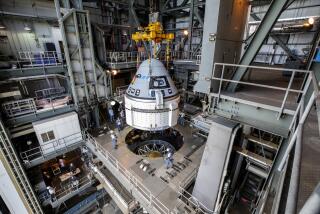C-17 Suffers Wing Damage in Tests : Aerospace: Troubles continue for McDonnell’s military cargo jet program. Analysts say the company may be forced to take another charge against earnings.
- Share via
McDonnell Douglas said Friday that the wings of its C-17 cargo jet were damaged during a ground test, and analysts raised the possibility that McDonnell Douglas may be forced to take a write-off because of the troubled program.
During a test Thursday at the Douglas Aircraft unit in Long Beach to measure the effect of stress on the non-flying test craft, “there was buckling and some damage to the surface of the upper part of the wing” on both sides of the plane, company spokesman Fred McCracken said.
The company does not yet know the extent of the damage or the cost of correcting the problem but is “aggressively” studying it, McCracken said.
The damage occurred at 130% of normal maximum operating loads, McCracken said. While that represents a safety margin of 30% above normal operating loads, it is below the level of 150% of normal maximum loads that the Air Force requires.
McDonnell Douglas, struggling to cope with defense budget cutbacks, has been plagued with production problems in its commercial and military programs. The company has cut thousands of jobs in recent years.
The Air Force plans to buy 120 C-17s at an estimated cost of $40 billion, but the program is already about $1 billion over budget and a year behind schedule.
The latest revelation follows by one week a Pentagon report detailing serious defects in the C-17’s wings that could cause cracks.
The investigation found that thousands of rivets that hold each wing together were improperly installed by Douglas with automated machines. The rivets then expanded twice as much as the company’s specifications called for.
The report also found that fasteners or nuts and bolts were improperly installed in the wings, which were partly responsible for fuel leaks that had grounded the C-17 three times in the last year.
McDonnell sharply disputed the Pentagon’s findings, asserting that the C-17’s wings are sound and do not have serious defects.
The damage from Thursday’s tests “has nothing at all to do with rivets or the riveting machines,” McCracken said.
He said the company does not expect the problem to significantly affect production schedules for the C-17. McDonnell Douglas’ stock fell $1 on the New York Stock Exchange on Friday, closing at $35, near its 52-week trading low of $34.50. The stock has traded as high as $80.50 in the last year.
The new test problem could result in a charge to earnings, analysts said. The company already took a $34-million charge for the C-17 program in the second quarter and an $80-million first-quarter charge.
“It will cost them some money and there will be a charge,” said Wolfgang Demisch, an aerospace analyst with UBS Securities. “I’m hopeful that the whole thing can be fixed for $3 or $4 a share. Wings are normally the most costly part of an airplane to change, so you never feel good about it. But there are reasons to feel optimistic.”
Times staff writer Ralph Vartabedian contributed to this report.
More to Read
Inside the business of entertainment
The Wide Shot brings you news, analysis and insights on everything from streaming wars to production — and what it all means for the future.
You may occasionally receive promotional content from the Los Angeles Times.







